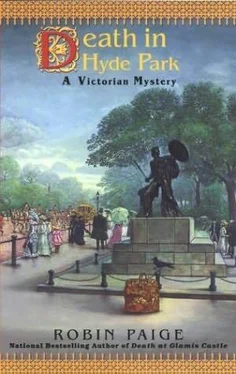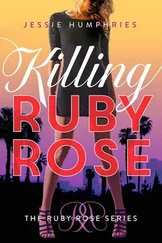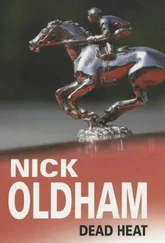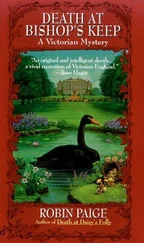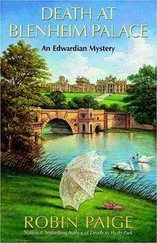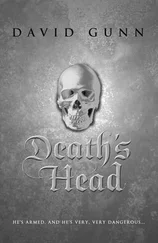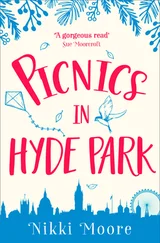Robin Paige - Death in Hyde Park
Здесь есть возможность читать онлайн «Robin Paige - Death in Hyde Park» весь текст электронной книги совершенно бесплатно (целиком полную версию без сокращений). В некоторых случаях можно слушать аудио, скачать через торрент в формате fb2 и присутствует краткое содержание. Жанр: Классический детектив, на английском языке. Описание произведения, (предисловие) а так же отзывы посетителей доступны на портале библиотеки ЛибКат.
- Название:Death in Hyde Park
- Автор:
- Жанр:
- Год:неизвестен
- ISBN:нет данных
- Рейтинг книги:5 / 5. Голосов: 1
-
Избранное:Добавить в избранное
- Отзывы:
-
Ваша оценка:
- 100
- 1
- 2
- 3
- 4
- 5
Death in Hyde Park: краткое содержание, описание и аннотация
Предлагаем к чтению аннотацию, описание, краткое содержание или предисловие (зависит от того, что написал сам автор книги «Death in Hyde Park»). Если вы не нашли необходимую информацию о книге — напишите в комментариях, мы постараемся отыскать её.
Death in Hyde Park — читать онлайн бесплатно полную книгу (весь текст) целиком
Ниже представлен текст книги, разбитый по страницам. Система сохранения места последней прочитанной страницы, позволяет с удобством читать онлайн бесплатно книгу «Death in Hyde Park», без необходимости каждый раз заново искать на чём Вы остановились. Поставьте закладку, и сможете в любой момент перейти на страницу, на которой закончили чтение.
Интервал:
Закладка:
So when Nellie realized that she had missed the period that was due a week after her evening with Jack, it was certainly no wonder that she was upset, and no wonder that her anxiety caused her to miss a few more cues and bobble a few more lines, which only led to greater stress and more missed cues and bobbled lines, and to the final humiliation.
Perhaps Nellie should not be blamed for thinking that, even if by some miracle she wasn’t pregnant, falling into bed with Jack London was the cause, pure and simple, of her professional downfall. Of course, she could not hold him solely responsible, for she knew she should have been more watchful, more on her guard against him. But Kate Sheridan was right, she thought with a weary anger. Jack had taken advantage of her naive eagerness to have a good time, and should she be indeed pregnant, he was going to find himself confronted with the responsibility of fatherhood. And if he felt no moral obligation to accept that responsibility, perhaps a letter to his wife in California might make him see the light.
But these thoughts provided cold comfort, and certainly offered no answer to her current dilemma. Nellie knew that she would have to start looking for work first thing in the morning. With a heavy sigh, she rose from her dressing table and began to pack her few belongings.
CHAPTER TWENTY-FIVE
BURGLAR SENTENCED TO 7 YEARS FINGERPRINTS GET TRIAL BY JURY NEW POLICE WEAPON AGAINST CRIME!
The Daily Telegraph, 3 September 1902The Central Criminal Court was adjacent to Newgate Prison, in an old stone building that was called the Old Bailey after the name of the street on which it stood. In 1086, at the time the Domesday Book was compiled, this particular site was next to a gate in the stone wall, or bailey, around the City of London. In 1188, Henry II ordered that a prison be built adjacent to the wall; it was constructed by two carpenters and a smith for the cost of three pounds, six shillings, and eight pence. Over the following centuries, the gate and the prison (now called New Gate) were demolished and rebuilt several times. In 1539, a sessions house, or court, was built adjacent to the prison, and became known as the Old Bailey. Charles knew that both Newgate-probably the most notorious of English prisons-and the Old Bailey were soon to be razed, in order to make way for a grand new structure designed by E. W. Mountford, although he doubted that even a splendid new judicial building would banish the tragic ghosts of the men, women, and children-debtors and criminals alike-who had died or been executed within Newgate’s dark, dismal walls.
But the demolition was not scheduled to begin until the following spring, and on Tuesday, the second of September, Charles Sheridan and Edward Savidge presented themselves in the covered yard between the prison and the Old Bailey, some thirty minutes before the trial of Henry Jackson was about to begin. They handed their admission cards to the sheriff’s usher and were directed up a stair, down a narrow passage, and into seats in the spectators’ section. The chamber was unusually crowded with people, mostly off-duty police officers, Charles suspected, since they had a significant stake in the outcome of the trial.
Charles and Savidge had scarcely taken their seats when they heard the usher’s cry. The crowd got to its feet as the judge entered and took his place at the bench. A moment later, Harry Jackson came in and stepped down to the front of the dock, his head bowed.
The trial went swiftly. Richard Muir, black-robed and white-wigged, outlined the Crown’s case and called several witnesses including Sergeant Collins, who told the impassive jury how the evidence was obtained and what it meant. Then Muir placed in evidence two photographic enlargements, comparing the single fingerprint that the burglar had left at the scene of the crime with that of the print of Harry Jackson’s left thumb. Sergeant Collins demonstrated the points of comparison between the two prints, and the Crown rested.
The barrister for the defense was witheringly scornful of both Sergeant Collins and the fingerprint evidence and dramatically passionate in his assertions of his client’s innocence, pleading with the jury not to convict a poor laborer on such intangible and untrustworthy evidence, “never before offered in a court of law,” he cried. But the jury, unmoved by his passion, returned within the half-hour with a guilty verdict. Jackson was sentenced to seven years, the judge’s gavel came down smartly, and the case was concluded.
“Well, that was one for the record books,” Savidge said, as he and Charles repaired to a table in a nearby coffeehouse much frequented by barristers and court officials.
“Yes,” Charles said, shaking his head. “Seven years for seven billiard balls. Hardly a fair sentence, if you ask me.”
“It’s not the sentence I’m talking about, and you know it,” Savidge retorted. “Students of the law will be reading about the fingerprint evidence for years to come.”
“And the police will have to learn how to deal with that kind of evidence,” Charles said thoughtfully. “It will mean more training, greater care in the handling of evidence taken from the scene of the crime, and much more attention to the proper custody of evidence. Men like Ashcraft may have a difficult time of it.”
“I doubt,” Savidge said wryly, “that Ashcraft will ever learn. He’s far too full of his own authority.” He looked at Charles over the rim of his coffee cup. “What did you make of the fingerprint evidence in our case?”
“The question is,” Charles said with a crooked grin, “what will the jury make of it? What’s your prediction, Savidge?”
Savidge shook his head. “I never attempt to guess how a jury will react-especially not in a complicated case like this one, with three defendants. It will take a smart jury to sort through it all.” He shrugged. “We’ll find out soon enough-day after tomorrow, in fact.”
Charles raised his cup in salute. “To success,” he said. “May the innocent prevail.”
Savidge gave a sarcastic laugh. “My word, Sheridan, you are an idealist.”
CHAPTER TWENTY-SIX
ACCUSED ANARCHISTS ON TRIAL TODAY 3 IN BOMBING PACT LINKED TO HYDE PARK EXPLOSION
Daily Mirror, 4 September 1902With Patrick’s ankle mended and her manuscript at last completed and ready to be delivered to her publisher, Kate came up to London early on Thursday, the fourth of September, the day of the trial. Charles had stayed in town during the intervening fortnight, busying himself with various investigations relating to the case, so they had little opportunity to discuss his work. Regarding the trial, he had left her a note at Sibley House saying that the preliminaries were scheduled to begin at ten o’clock in the morning. If she wished to attend, she should get there early, for it was likely that the spectators’ box would be full.
Kate herself was not very interested in criminal trials and could think of several other productive ways to spend the day in London. But Beryl Bardwell was always fascinated by anything that smacked of the dramatic or presented narrative possibilities. You never know, she reminded Kate, when we’re going to have occasion to include a trial scene in one of our fictions. So we’d better take advantage of this opportunity. Thinking it over, Kate had decided that Beryl was right. So that’s why she was waiting in the spectators’ line in the yard of the new Criminal Court Building in Old Bailey when the hearse-like horse-drawn van arrived, bringing the prisoners from Holloway Prison.
“Ooh, look!” crowed a stooped old lady to her companion, both standing in the line in front of Kate. “’Tis the Black Maria. And them Anarchists, ain’t they a sight?”
Читать дальшеИнтервал:
Закладка:
Похожие книги на «Death in Hyde Park»
Представляем Вашему вниманию похожие книги на «Death in Hyde Park» списком для выбора. Мы отобрали схожую по названию и смыслу литературу в надежде предоставить читателям больше вариантов отыскать новые, интересные, ещё непрочитанные произведения.
Обсуждение, отзывы о книге «Death in Hyde Park» и просто собственные мнения читателей. Оставьте ваши комментарии, напишите, что Вы думаете о произведении, его смысле или главных героях. Укажите что конкретно понравилось, а что нет, и почему Вы так считаете.
